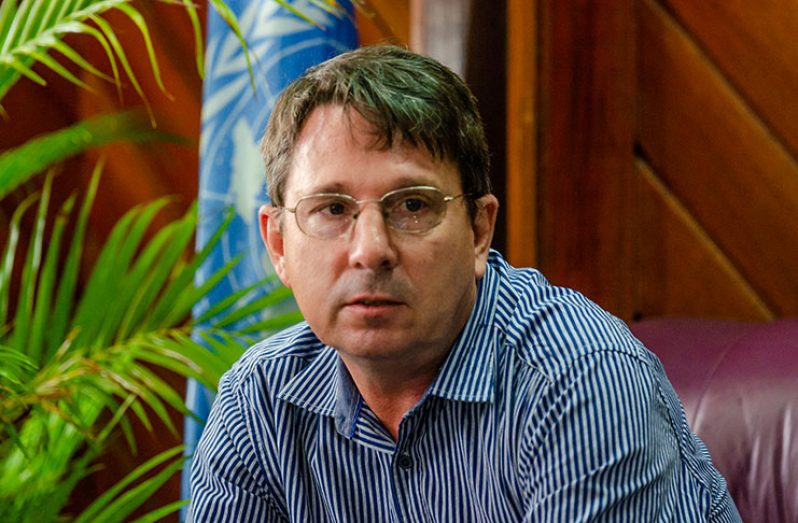By Gabriella Chapman
THE United Nations Children’s Fund (UNICEF) is in full support of efforts by the Ministry of Education (MoE) to meet the needs of migrant and remigrant children across Guyana.
Over the past year, Guyana has seen a large inflow of Venezuelans and returning Guyanese who are fleeing the ongoing crises in Venezuela.
A large percentage of these migrants and remigrants are children and the MoE, in collaboration with UNICEF and other UN agencies, have been making efforts to afford them the good life and equal opportunity to develop.
In an interview with the Guyana Chronicle, UNICEF’s Emergency Officer, Ian Jones, said the position of the ministry is that where there is available space, migrant and remigrant children can be accepted into the public school system.
UNICEF, he said, has been in full support of the ministry’s position, and in places where there is not enough space, they are working towards ensuring that systems are in place to accommodate the children.
Jones said that thus far, a total of 670 children have been admitted into the formal public school system across the regions.
Barima Waini (Region One) accounts for 182; Pomeroon Supernaam (Region Two), 110; Essequibo Islands-West Demerara (Region Three), 239; and Georgetown, 29.
“In Eteringbang, Cuyuni Mazaruni (Region Seven), the MoE, with the assistance of a private property owner, are establishing a nursery and primary school for 110 migrant/remigrant children due for September term opening,” Jones said.
Currently, UNICEF has been lending financial support for additional school furniture and supply of English/Spanish learning materials for schools in host communities. This has started in Region One and UNICEF is on standby to respond to support requests from other education districts.
Jones said the international agency has received reports that the student populations in Mabaruma and Port Kaituma have significantly increased.
He said at the end of the month, a team will be going to scope out the sub-regions and through their partnership with the Faculty of Engineering and Technology, University of Guyana, they will design and implement School Improvement Plans to increase and enhance available learning spaces.
This will be done for all schools that have had a significant increase in their student population due to migrants and remigrants admittance.
CHALLENGES
Jones said the admittance of the migrant and remigrant children into the school system has its challenges, but there are MoE-led strategies to address them.
The stretching of the coping capacity of border region schools is a notable challenge since the learning spaces, education resources and provision of school meals are somewhat limited.
UNICEF, Jones said, has been increasing resource mobilisation and targeted support to impacted schools.
Another challenge is that the children have limited English Language skills.
To address that, UNICEF and the United Nations High Commissioner for Refugees (UNHCR) have been identifying teachers who are verse in Spanish and Warrau languages to be trained in English to teach the migrant and remigrant children.
This training will enable the teachers to remove the language barrier. The children are also facing challenges in adjusting with their host community counterparts.
Jones said they have been coordinating with host schools to ensure the availability of bi-lingual/multi-lingual counselling and mediation support.
“Sports for development initiatives are also being implemented to encourage interactions and group activities,” he said.
In addition to the educational support, Jones said there is need for psychosocial support for the children and their parents.
To this end, all the UN agencies, he said, have been working together to provide the necessary support that the families need to understand and access social services that alleviate the challenges faced with living in a new environment.
OUT OF SCHOOL EDUCATION
Jones also highlighted that from their field assessment in the various communities, of the total number of migrant and remigrant children, some 75 per cent are not in school.
The reasons given, he said, are language barriers, host community schools inability to admit more students and some children are unprepared for formal education.
“Through collaborations, the UN agencies will give support to the relevant district education departments to increase and enhance available learning spaces and provide additional required resources to support schools to cope with increased populations. Additionally, we are lending support to the Early Childhood Development (ECD) interventions, to develop basic skills necessary for young children to enter the formal education system,” Jones said.



.jpg)








